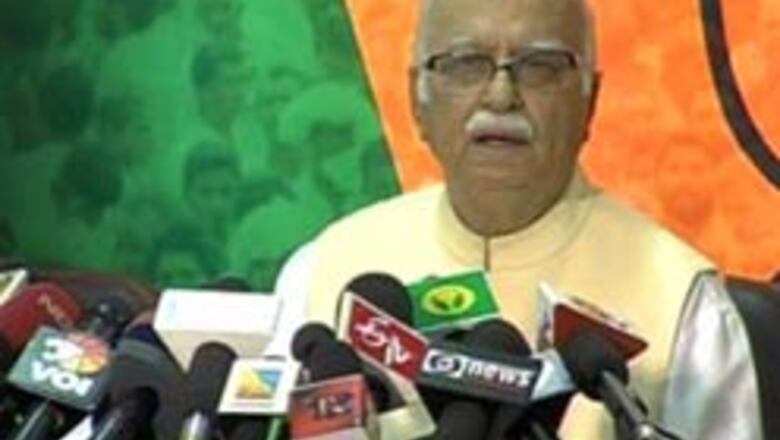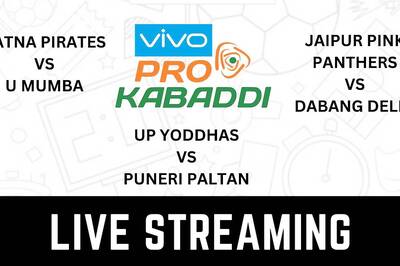
views
New Delhi: As the BJP braces for assembly and national elections, its prime minister hopeful L K Advani is shedding his Hindu hardliner image to present himself as a moderate leader a la Atal Bihari Vajpayee.
Almost suddenly as it were, the man who will be 81 on Saturday is attending more and more youth-oriented events, some apparently insignificant, regaling the audiences with anecdotes from his eventful political career.
The new Advani is funny to the extent of making youngsters roar in laughter.
On October 20, after launching Indiabanao.org, to inspire and involve the young in social and political events, Advani narrated how he and Vajpayee watched a movie at Old Delhi's Imperial cinema after being routed in a local election.
"Only when the movie started we realised it was Raj Kapoor's Phir Subah Hogi," laughed Advani at the irony, addressing hundreds packed in an auditorium in the heart of New Delhi.
He also talked about technology and spoke about his visit to the Microsoft head office in the US.
Before the programme began, organisers introduced Advani—the man who would be India's prime minister if the BJP-led coalition wins the national elections next year—as someone who "loves chocolates, movies, cricket and always carries an I-pod" on him.
In some recent events, Advani has spoken freely and frankly about the shortcomings of his generation. On these occasions he has avoided hardcore political issues.
Advani seems to be consciously taking steps to make himself more acceptable to all sections of the people, in contrast to the 1980s when he emerged as a committed Hindutva politician.
Today, he rarely talks about his once favourite theme -- the emotive campaign to build a Ram temple at the site of the Babri mosque in Ayodhya, a movement that sparked the worst Hindu-Muslim violence since 1947.
When Hindu-Christian violence erupted in Orissa in August, Advani tried to broker peace between leaders of both the communities. But criticism persisted that he was not condemning Hindu right-wingers attacking Christians.
PAGE_BREAK
Again, when a Hindu ascetic was accused of bombing a Muslim gathering in Malegaon in Maharashtra killing five people, Advani declared that she must be punished if she is indeed guilty.
Is this a political strategy? Is this image makeover deliberate, to win wider political and social support as he leads the BJP to elections in six states starting November 14 and later to the Lok Sabha?
BJP leaders admit that Advani is cultivating the image of a moderate politician, with a view to stepping into the shoes of Vajpayee, his long-standing colleague who was prime minister from 1998 to 2004.
Everyone agrees that the 2009 parliamentary election will perhaps be the last chance for Advani to become prime minister -- a dream he is known to have had for long.
Like Vajpayee, Advani is now appearing to be making the right noises to woo the large urban educated middle class whose support will be crucial in any electoral battle.
The BJP denies Advani is changing.
"People and his critics have started understanding him only now because of his (projection as prime minister)," said his confidant and former BJP president M. Venkaiah Naidu. "He is very firm in his ideology."
Congress spokesman Manish Tiwari called him a "leopard (who) cannot change his spots".
"However moderate a image he may try to project, the country knows he is a fanatic, rightwing, retrogressive, divisive," said Tiwari. "Even in his attempt to look secular, he embraced the worst communalist of South Asia, (Mohammed Ali) Jinnah."
Tiwari's reference was to Advani's surprising endorsement of Jinnah during his 2005 visit to Pakistan, comments that drew angry responses from Hindu hardliners who once worshipped the BJP veteran.
Other critics are far less charitable. They argue that Advani remains at heart a Hindu hardliner but realises that he needs to moderate himself to become an acceptable national leader.
Said one BJP leader who declined to be named: "He does not attend RSS (Rashtriya Swayamsewak Sangh) meetings as frequently as he used to earlier. All of us have noticed it."
This is the same Advani who joined the RSS in the 1940s, the Jana Sangh in 1951 and finally supervised a movement that led to the razing of the Babri mosque in 1992, an event whose aftermath is still being felt.




















Comments
0 comment